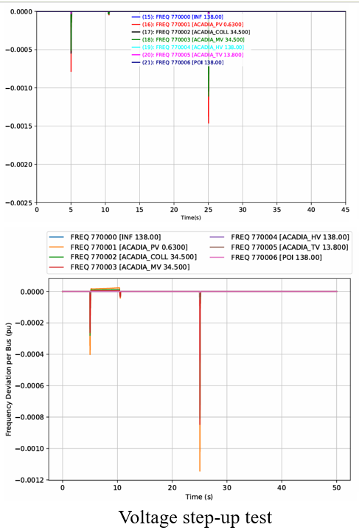Ensuring model accuracy and validation is essential to maintaining grid stability and compliance. PJV specializes in performing Model Quality Tests (MQT) as required by ISOs/RTOs, focusing on validating dynamic models to ensure they accurately reflect the real-world behavior of generating units under various grid conditions. Our approach includes evaluating critical aspects such as Voltage Ride Through (VRT), frequency response, active/reactive power control, and dynamic model accuracy, which are crucial for maintaining grid stability.

The MQT process, as outlined by ISOs/RTOs, involves a comprehensive verification of the dynamic model's performance during various grid events, including voltage dips, frequency deviations, and fault conditions. The objective is to ensure that the dynamic model accurately simulates the generator's behavior, especially during critical scenarios that could impact system reliability. Key performance indicators include the ability to maintain stability during voltage disturbances and proper fault ride-through capabilities.
PJV conducts detailed comparisons between simulation results and field measurement data to assess the model’s accuracy. This process helps identify potential discrepancies that may affect the generator's performance during real-world events. Furthermore, our MQT services include compliance reporting, where we document model accuracy, verification steps, and recommendations for improvements, if necessary.
By ensuring that dynamic models meet ISOs/RTOs’ stringent requirements, PJV assists clients in demonstrating compliance, optimizing model performance, and enhancing overall grid resilience. Our approach not only fulfills regulatory obligations but also supports proactive grid management and reliable power system operation.
According to ISOs/RTOs requirements, the Model Quality Test (MQT) includes rigorous validation to ensure the model's accuracy and its capability to predict dynamic responses under system disturbances. This involves assessing the model’s performance in simulating grid faults, voltage dips, frequency events, and other operational scenarios. PJV’s methodology involves comparing model outputs against field measurements to identify discrepancies and improve model fidelity. The VRT evaluation focuses on ensuring that generating units can withstand voltage disturbances without tripping, thereby maintaining operational continuity.
By conducting comprehensive MQTs, PJV helps clients demonstrate compliance with ISOs/RTOs standards, optimize model performance, and enhance grid resilience. Our experience in power system modeling and dynamic analysis enables us to address potential challenges proactively, ensuring that our clients' generating units meet stringent reliability and stability criteria.
PJV's expertise encompasses conducting comprehensive testing and analysis to verify model performance, reliability, and consistency with actual system behavior. This process helps identify potential discrepancies and areas for improvement, ensuring that power system models are robust, accurate, and aligned with regulatory standards. By conducting MQT effectively, PJV supports clients in maintaining compliance, optimizing system performance, and enhancing overall grid resilience.

 The MQT process, as outlined by ISOs/RTOs, involves a comprehensive verification of the dynamic model's performance during various grid events, including voltage dips, frequency deviations, and fault conditions. The objective is to ensure that the dynamic model accurately simulates the generator's behavior, especially during critical scenarios that could impact system reliability. Key performance indicators include the ability to maintain stability during voltage disturbances and proper fault ride-through capabilities.
The MQT process, as outlined by ISOs/RTOs, involves a comprehensive verification of the dynamic model's performance during various grid events, including voltage dips, frequency deviations, and fault conditions. The objective is to ensure that the dynamic model accurately simulates the generator's behavior, especially during critical scenarios that could impact system reliability. Key performance indicators include the ability to maintain stability during voltage disturbances and proper fault ride-through capabilities.